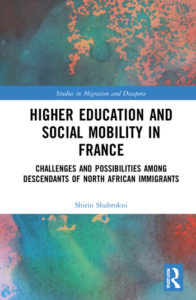Author: Carli Gardner
A celebration of Glendon’s diverse research achievements occurs annually at the Research Festival hosted by the Research and Innovation Office. This year, the Research Festival was a week-long virtual event showcasing research projects from faculty and student across Glendon’s 26 disciplines.
One of the many highlights of this year’s Research Festival was the event celebrating the launch of Dr. Shirin Shahrokni’s new publication. Associate Professor in the department of Sociology at Glendon, Shahrokni published her book Higher Education and Social Mobility in France with Routledge this past winter.
Her study focuses on the trajectories and experiences of social mobility of descendants of post-colonial immigrants in France, and through the analysis of these trajectories examines the structural barriers that exist and persist in France’s education system, specifically in the French “grandes écoles.” Shahrokni uses qualitative analysis from life-history interviews to fill a crucial gap in data on upwardly mobile second-generation immigrants settling in the French middle class.
According to the National Ministry of Education in France, a “grande école” is defined as “a higher education institution that recruits its students by competitive examination and provides high-level training.” École normale superieure, a “grande école” commonly referred to as the ENS, was founded in 1794 mainly to train researchers and professors. It has research departments across all fields, from the natural sciences, to the humanities, and even the social sciences.
Instead of accepting quantitative data as the only information influencing French perceptions of its students with immigrant backgrounds and their paths to upward social mobility, Shahrokni approaches her research with an understanding of the nuances and complexities that are inherent in individuals’ multi-layered subjective experiences.
As Shahrokni’s interviews reveal, sometimes students’ legitimacy in attending these elite institutions, as well as their academic skills, are questioned in the classroom. Her respondents also raised the issue of unequal access to resources and information about the “grandes écoles” in their pre-admission trajectories. Finally, despite being part of an elite group, many expressed uncertainties about achieving a professional status commensurate with their qualifications.
The comprehensive research on social mobility and race exhibited in Higher Education captures the operation of racism within elite spaces, shedding light on a topic which has not been previously explored due to official insistence on the absence of racist structures in French society. This study also examines the multiple individual and collective strategies, informal and formal, that its respondents deploy in response to these challenges.
Examining the French policies and practices that exist to allow children of immigrants the opportunities to succeed in the nation’s education system and labour markets, Shahrokni uncovers “that France’s colonial past is re-enacted in contemporary French society”.
Shahrokni’s research also highlights the important role played by working class, immigrant families in the educational success of their children, a role that remains poorly documented by research into the sociology of immigration, particularly in France. In particular, she highlights a set of moral and emotional resources such as the role of migratory histories passed on by older siblings, or the deployment of educational strategies within the siblings, in the educational success trajectories of her interviewees. Thus, for many of the people Shahrokni interviewed, this success is as much collective as individual.
Shahrokni’s commitment to challenging embedded social structures in her research extends to her work in the classroom. Shahrokni brings intersectional and anti-racist approaches to her teaching by empowering students to speak about the connections between the course material and their own lived experiences.
Professor Shahrokni also dedicates her teaching practice to “challenging the Eurocentrism ingrained within the field of Sociology by actively integrating the works of diverse sociologists and sociological perspectives into the course syllabus.”
Glendon is proud to highlight the important research undertaken by Dr. Shirin Shahrokni in her latest publication Higher Education and Social Mobility in France. The Research and Innovation Office looks forward to hosting next year’s Research Festival to showcase new research achievements from students and faculty at Glendon.
To learn more about the events from this year’s Research Festival, including Professor Shahrokni’s book launch, click here.



